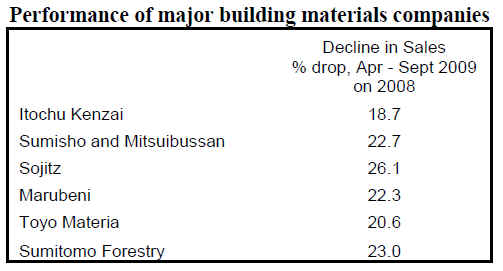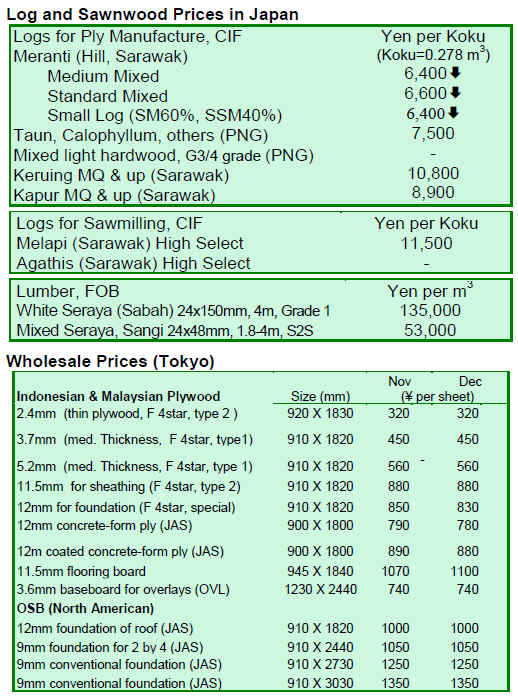Japan Wood Products
Prices
Dollar Exchange Rates of
14th December 2009
Japan Yen 88.58
Reports From Japan
Deteriorating softwood plywood market
Market prices for domestically manufactured softwood
plywood continue downwards and have now dropped to
record lows says the Japan Lumber Reports (JLR).
Panic selling by wholesalers is driving down prices day
after day and there are fears that some seriously weakened
domestic manufacturers could be put out of business
As companies try and secure a larger share of the market
they are abandoning consideration of the demand levels so
there is growing confusion in the sector.
This highly irrational market for softwood plywood is
impacting the market for imported hardwood plywood.
With the continued Yen appreciation over the past weeks
importers are tempted to re-stock but are holding back
because the whole market is in turmoil.
At the moment traders do not want to carry high
inventories because the market situation is so uncertain.
Building materials company results
The financial performance of five major building trading
firms, plus partial data from Sumitomo Forestry, over the
past half year have been reported by the JLR and are
summarized below.
Overall total sales declined by 22 % from the same period
last year and ordinary profit levels fell a massive 29%.

Profits have been driven down by low housing starts and
by weak demand for building products.
The JLR says that market condition will likely remain
unchanged during the second half of the financial year and
that full year company results will probably be in line with
those of the first half.
Plywood mills buying logs
Plywood mills in Japan are still actively buying tropical
hardwood logs as their stocks have been declining. Recent
buying activity in the SE Asian log market is because log
supply is likely to drop in February due to the Chinese
New Year holidays and the rain season, both of which
slow harvesting. Tropical hardwood log consumption in
November was 45,000 cu.m.
Sarawak Meranti regular log prices on the Japanese
market are reported by the JLR at 6,200-6,300 yen per
koku CIF. Small Meranti log prices are 5,200-5,300 yen
while Sabah kapur (floater) log prices are about 8,900 yen
per koku CIF.
Reports are indicating that log harvest rates and
transportation volumes in the producing countries are
dropping rapidly due to unfavorable weather conditions,
usual for this time of year. Importers say that the weather
will improve and water level in the rivers will be back to
normal in a short time so that towing of logs downstream
can resume.
The lower log availability has the effect of firming prices.
Sarawak Meranti regular log prices are US$180-185 per
cu.m FOB. Small Meranti logs are selling at US$140-145
and super small Meranti logs are reported as US$125-130
per cu.m FOB. Sabah Kapur prices are US$225-230 per
cu.m FOB. Generally, prices have not increased much but
grades which are in short supply are up US$5 per cu.m.
October housing starts
Total housing starts in Japan during October were 67,120
units, 27% less than the same month a year earlier. This is
the eleventh consecutive month of decline and a record
low for the month of October. The JLR is predicting that
total year stars would be below 900,000 units.
Because of the weak economic situation in Japan buyers
are opting for lower cost units and the average house floor
space in October was 21% down on a year ago.
Sumitomo/Toyo merger
Sumitomo Forestry announced that Sumitomo Forestry
Crest Co., Ltd. (Crest) and Toyo Plywood Co., Ltd., both
subsidiary companies of Sumitomo Forestry, would merge
from March, 2010. Crest will be the surviving company
but the Toyo plywood brand name ‘Topura’ will be still be
used after the merger.
Both companies are plywood manufacturers but, because
of the weak demand for building materials the merger will
allow for streamline of administrative functions. The
surviving entity will, according to the JLR, target some
Yen 39 billion in sales by 2012.
October plywood supply
Total plywood availability in Japan during October was
12.3% less than October last year but up 9.4% over
September levels. Volumes of imported plywood were
more than expected and on top of this, domestic
production increased by 6.4% from September.
In particular, softwood plywood production was
190,000cu.m, 7.4% more than in September, The figure
for October was the highest monthly production since
October 2007 but sales dropped to 168,000 cu.m, down
4.1% which resulted in a big jump in inventories. The end
of October inventory was 207,000 cu.m, 12% more than
for September.
Plywood imports in October were 274,788 cu.m, 19.2%
less than October last year but 11.9% more than
September. With rising production, weak demand and
increased imports inventories are seriously out of step with
demand levels.

|